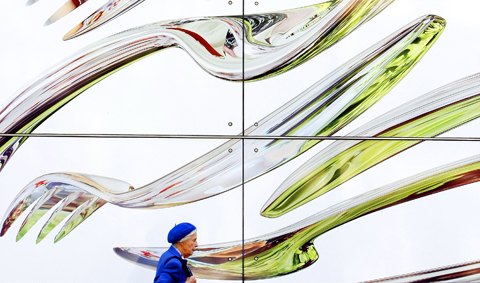Australia’s central bank said yesterday the country is accelerating faster than expected out of the global downturn thanks partly to demand from China, but warned against becoming too reliant on just a few countries for the recovery.
In its latest quarterly statement on monetary policy, the Reserve Bank of Australia (RBA) more than tripled this year’s growth forecast to 1.75 percent from the 0.5 percent it predicted in August and raised its forecast for next year to 3.25 percent from 2.25 percent.
RATE HIKE

PHOTO: REUTERS
The RBA — which last month became the first central bank of a developed economy to raise interest rates and hiked them again this week — signaled it would keep winding back a series of cuts that took rates to five-decade lows this year to keep the economy moving.
“A further gradual lessening of monetary stimulus is likely to be required over time if the economy evolves broadly as expected,” the bank said.
Australia’s stock market rallied yesterday, with the main benchmark rising nearly 2 percent. Since the start of the year, Australia’s currency has risen more than 30 percent while the stock market has climbed almost 24 percent.
There is growing evidence that Australia has weathered the economic downturn well.
The bank credited lower rates, some A$42 billion (US$37 billion) in government stimulus spending and “the strong bounce back in Asia, particularly in China.”
“Asia is at the forefront of the global recovery,” it said.
MINERALS
Helping drive Australia’s growth are the huge amounts of iron ore and other minerals it exports to China, Japan, South Korea and other nations.
The bank said export volumes had stayed broadly unchanged despite a sharp downturn in global trade and investment in the sector — especially in liquefied natural gas — is expected to grow.
“This expected rise in investment — which is already at a high level relative to GDP and compared with other developed economies — should further boost the supply side of the Australian economy, although as it takes place, short-term capacity restraints could again emerge in part of the economy,” the bank said.
In a speech late on Thursday, RBA Governor Glenn Stevens cautioned that outsized growth in the share of the economy taken up by mining could drain workers and other resources from other sectors, potentially reducing the economy’s resilience.
“The emergence of China and India is a benefit to Australia, but we stand to have a heightened exposure to anything going seriously wrong in those countries,” Stevens said.
Still, “such concentration ... may well be worth accepting if the return from doing so were high enough, as it appears they might be,” he said.

Taiwan is projected to lose a working-age population of about 6.67 million people in two waves of retirement in the coming years, as the nation confronts accelerating demographic decline and a shortage of younger workers to take their place, the Ministry of the Interior said. Taiwan experienced its largest baby boom between 1958 and 1966, when the population grew by 3.78 million, followed by a second surge of 2.89 million between 1976 and 1982, ministry data showed. In 2023, the first of those baby boom generations — those born in the late 1950s and early 1960s — began to enter retirement, triggering

One of two tropical depressions that formed off Taiwan yesterday morning could turn into a moderate typhoon by the weekend, the Central Weather Administration (CWA) said yesterday. Tropical Depression No. 21 formed at 8am about 1,850km off the southeast coast, CWA forecaster Lee Meng-hsuan (李孟軒) said. The weather system is expected to move northwest as it builds momentum, possibly intensifying this weekend into a typhoon, which would be called Mitag, Lee said. The radius of the storm is expected to reach almost 200km, she said. It is forecast to approach the southeast of Taiwan on Monday next week and pass through the Bashi Channel

NO CHANGE: The TRA makes clear that the US does not consider the status of Taiwan to have been determined by WWII-era documents, a former AIT deputy director said The American Institute in Taiwan’s (AIT) comments that World War-II era documents do not determine Taiwan’s political status accurately conveyed the US’ stance, the US Department of State said. An AIT spokesperson on Saturday said that a Chinese official mischaracterized World War II-era documents as stating that Taiwan was ceded to the China. The remarks from the US’ de facto embassy in Taiwan drew criticism from the Ma Ying-jeou Foundation, whose director said the comments put Taiwan in danger. The Chinese-language United Daily News yesterday reported that a US State Department spokesperson confirmed the AIT’s position. They added that the US would continue to

The number of Chinese spouses applying for dependent residency as well as long-term residency in Taiwan has decreased, the Mainland Affairs Council said yesterday, adding that the reduction of Chinese spouses staying or living in Taiwan is only one facet reflecting the general decrease in the number of people willing to get married in Taiwan. The number of Chinese spouses applying for dependent residency last year was 7,123, down by 2,931, or 29.15 percent, from the previous year. The same census showed that the number of Chinese spouses applying for long-term residency and receiving approval last year stood at 2,973, down 1,520,